-
 Art of Wellness Acupuncture & Traditional Chinese Medicine (TCM)11704 Wilshire Blvd, Suite 295, Los Angeles, CA, 90025
Art of Wellness Acupuncture & Traditional Chinese Medicine (TCM)11704 Wilshire Blvd, Suite 295, Los Angeles, CA, 90025
myartofwellness@gmail.com310-451-5522 Office Hours
MonClosedTue7:30 am --4 pmWed7:30 am --4 pmThu7:30 am -- 4 pmFri7:30 am -- 4 pmSat7:30 am -- 4 pmSunClosedOur office opens from Tuesdays to Saturdays 7:30 am to 4 pm, will be closed on Memorial day, Independent day, Labor day, Thanksgiving day, Christmas and New year.
-
Recent Posts
- Chinese New Year 2026: Year of the Horse
- Acupuncture and TCM Treatment for Perimenopause Symptoms
- How to Treat Insulin Resistance With Acupuncture and TCM
- How to Treat Metabolic Syndrome With Acupuncture and TCM
- How to Treat Syncope With Acupuncture and TCM
- How to Treat Thoracic Outlet Syndrome With Acupuncture and TCM
- How to Treat Dupuytren’s Contracture With Acupuncture and TCM
- How to Treat Nutcracker Syndrome With Acupuncture and TCM
- How to Treat Rosacea With Acupuncture and TCM
- How to Treat Perioral Dermatitis With Acupuncture and TCM
- Lymphatic Drainage With Acupuncture and TCM
- How to Treat Turf Toe With Acupuncture
- How to Treat Nerve Pain With Acupuncture and TCM
- How to Treat Watery Eyes With Acupuncture and TCM
- How to Treat Ovarian Cysts With Acupuncture and TCM
- How to Treat Dystonia With Acupuncture and TCM
- Sign up to receive news and updates and get my free report:“The Top 10 Reasons to Try Acupuncture”

December 2025 M T W T F S S 1 2 3 4 5 6 7 8 9 10 11 12 13 14 15 16 17 18 19 20 21 22 23 24 25 26 27 28 29 30 31
Moxibustion
How to Treat Hemorrhoids With Acupuncture and TCM
By Xiaomei Cai, L.Ac., Ph.D. & Qineng Tan, L.Ac., Ph.D.
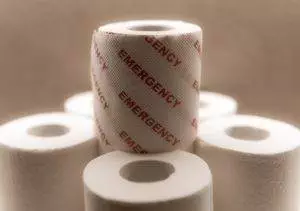
Bleeding and discomfort when you go to the bathroom? Burning or itching around the anus? Hemorrhoid pain is caused by swollen blood vessels around the rectum. Acupuncture and TCM reduce inflammation and can bring swift hemorrhoid relief.
Sometimes called “piles,” (from the Latin “pila,” meaning “balls”), hemorrhoids often do resemble little balls or clusters of grapes. The word “hemorrhoid” actually refers to the specific formation of blood vessels and cushioning tissues that surround the anus. Colloquially, though, the term is usually used to describe the condition of inflammation and irritation that can occur in this area.
Hemorrhoids are very common; probably more than half the population experiences them at some point in their life. However, the discomfort of talking to a doctor about hemorrhoids can be almost as miserable as the physical discomfort of having them, so many people avoid getting hemorrhoid help.
How do you know if you have a hemorrhoid? Sometimes people have a lot of itching, burning and discomfort after a bowel movement, or throughout the day. Sometimes there is no pain, but you may see a little bit of blood in the toilet bowl, or when you wipe with toilet paper. When you touch the area, you may feel a lump, or swollen tissue.
Hemorrhoids are generally classified into two categories based on their location: internal hemorrhoid and external hemorrhoid. Internal hemorrhoids form inside the anus and lower rectum and can cause bleeding, usually without pain. In some cases, though, the swollen veins can protrude out from the anal sphincter during or after a bowel movement and then need to be pushed back in. This is called a “prolapsed internal hemorrhoid.” The situation can become more serious if the internal hemorrhoid can’t be pushed back in, or if a blood clot develops in the vessel (thrombosis); then, it becomes painful to go to the bathroom, or even sit. In some cases, a prolapsed hemorrhoid becomes “strangulated,” meaning the blood supply is cut off, which can cause severe pain. Hemorrhoids become prolapsed because the connective tissues in the area weaken due to intense pressure, usually due to straining during a bowel movement, or because of the extra weight of pregnancy or obesity.
External hemorrhoids develop outside the anus, under the skin. These are the kind of hemorrhoids that tend to cause itching and a little bit of bright red bleeding. Again, they are aggravating, but not too serious unless a blood clot forms; then, it is called a “thrombosed external hemorrhoid.” This type of hemorrhoid can turn blue or purple in color and become acutely painful. In some cases, surgery will be performed to drain blood from the clot, or remove the hemorrhoid.
Most of the time, people suffer quietly with hemorrhoids, waiting for them to go away on their own. Only when they cause severe pain and bleeding are medical treatments considered. However, TCM and acupuncture offer a way to deal with hemorrhoids so that they heal more quickly and reduce the chance to return.
Top 10 Hemorrhoid Causes

What causes hemorrhoids? The tissues and blood vessels around the anal area can become weak, irritated, and inflamed. The upright posture of our human bodies naturally puts pressure on the elimination organs. Many women get hemorrhoids during pregnancy and/or birth because of intense pressure on the perineal area.The major reasons for hemorrhoids include:
- Pregnancy
- Constipation
- Diarrhea
- Sedentary lifestyle
- Straining while on the toilet
- Sitting too long on the toilet without progress
- Lack of dietary fiber
- Obesity
- Family history of hemorrhoids
- Aging
Overall, focusing on eating a diet that includes plenty of fiber, drinking enough water, maintaining good bathroom habits (going when you feel the urge and not waiting) and a healthy weight will go a long way towards preventing hemorrhoids. But what can you do when you already have hemorrhoids?
Treatment for Hemorrhoids

Often, people will just deal with hemorrhoid itching and pain on their own by using over-the-counter products like creams that contain phenylephrine, which constricts blood vessels (Preparation H), or disposable wipes impregnated with witch hazel and other soothing ingredients (Tucks medicated pads). These treatments may help reduce pain and swelling temporarily, but they do not get rid of hemorrhoids at their root.
When people do talk to their doctor about hemorrhoids, they may be prescribed something stronger, like a steroid cream, or hydrocortisone rectal suppositories.
If the situation persists or becomes more severe, there are several types of outpatient procedure to treat hemorrhoids, including rubber band ligation, sclerotherapy, infrared photocoagulation, and electrocoagulation. All of these procedures cut off blood supply to the hemorrhoid, so that it will form scar tissue and fall off. Hemorrhoid stapling and hemorrhoidectomy are outpatient procedures in which the hemorrhoids are surgically removed, and/or prolapsed tissues are affixed back inside the anus. While these surgeries may be helpful in some cases, recovery can be painful, and there can be problems with the way things work afterwards, potentially leading to more surgery later on.
When hemorrhoids are severe, it is a good idea to consult your doctor, as there are more serious conditions that may produce similar symptoms of pain, itching, or bleeding, including anal fissure (torn tissue or open sore in the anus due to trauma or Crohn’s disease complications), anal abcess (infected cavity in the anus) or anal fistula (an opening from the anal or rectal area that drains pus and/or fecal matter). Sometimes skin tags develop around the area where a hemorrhoid has healed. These can be irritating and difficult to keep clean, so they may need to be surgically removed.
For the treatment of hemorrhoids, TCM methods can provide relief from symptoms and help to reduce the inflammation that caused them.
Can Acupuncture Help Hemorrhoids?
According to TCM philosophy, hemorrhoids can often be related to a build-up of heat and/or dampness in the lower abdominal area; it’s the heat and dampness that cause the blood vessels to swell. You might be concerned by the idea that acupuncture treatment for hemorrhoids would involve needles being placed in a highly sensitive, private area. Let us reassure you this is not the case. The Du Mai meridian, also known as the “Sea of Yang,” is the channel which runs from the rectum area up along the spine to the top of head and then down to the mouth, controlling Yang energy throughout the body. We use points along this meridian, on the top of the head, and in other parts of the body to draw excess heat and dampness away from the area where the hemorrhoids are.
Other presentations of hemorrhoids include:
Top 5 Types of Hemorrhoids Presentation in TCM
- Spleen Qi Deficiency – This is when people tend to have poor digestion, bloating, gas, and diarrhea, going to the bathroom very often; the hemorrhoids feel swollen, but not as red. We use moxibustion to work on stomach point 36 meridian point, CV points 6 and 4, and spleen 6 in the middle of the abdomen to help digestion.
- Spleen Qi Sinking- This presentation tends to happen to people who are thinner, not only having hemorrhoids, but all the organs tend to be lower than usual; may also have prolapsed bladder or uterus, and poor digestion. Moxibustion applied to the middle of the top of the head will head the Qi rise up. For both types, doing Kegel type exercises regularly can help to strengthen the rectal area, also the uterus and bladder. Do three sets, increasing a bit every time: for example squeeze 30 times, release, do again 35, rest, next 40, then rest. Do this exercise every morning and evening.
- Blood Stasis – This type is more and more common because of our modern lifestyle, due to sitting a lot for work, which causes blood circulation to be compromised. In Chinese, we have a proverb: “for 10 people who sit too long, 9 will have hemorrhoids.” These manifest more as red, swollen, maybe bleeding. Kegels will also be helpful here, too.
- Lower Jiao Fire/Heat – This is when the lower part of the body has too much fire. For this type of hemorrhoids, people tend to have more bleeding, especially triggered by having alcohol, spicy food, crunchy food. These are the kind that may feel very sore with a burning sensation and tend to bleed, especially when wiping.
- Intestinal Dryness – especially here in California, where we have hot, dry weather, without a good habit of drinking water, people can tend to constipation, even going only once or twice a week. These types of hemorrhoids are due to dry, uncomfortable bowel movements, and may have itching and bleeding. Adding more water (warm is better) and more moisturizing foods (sesame oil and lots of ripe bananas, flax seeds, chia, sweet potato/yam, prunes) will be helpful.
Kegel type exercise is helpful for all of these types, to strengthen the sphincter muscle and bring more circulation to the area. Add more movement overall. At bedtime, leg lifts, bicycle movements in the air, upside down, are a good way to exercise without putting pressure on the lower body.
Ideally, when there is good digestion, between 5:00 – 7:00 a.m. is when people should naturally want to go, quickly, without too much need to push. Sitting on the toilet for too long creates the pressure that leads to hemorrhoids.

Moxibustion treatment–the burning of the herb mugwort near an area–can be very effective for reducing pain quickly. Chinese herbal formulations, used both internally and externally, can help relieve inflammation and pain. An herbal tea formula may include herbs to help strengthen the energy of the spleen, and to lubricate the digestive tract.
We also recommend sitz baths as a home remedy for hemorrhoids: short, 15-minute baths in warm water, to help soothe the area and keep it clean. Your acupuncturist may give you an herbal bath sachet to use to help reduce inflammation and soother the tissues.
One study of acupuncture treatment for internal hemorrhoids showed that, after 24 days, 86% of patients were “cured,” while another 8% showed significant improvement.
Your acupuncture practitioner will also talk with you about changes you can make in your diet and bathroom habits that will help you get things moving more easily.
Acupuncture Near Me for Hemorrhoids
Hemorrhoids are not only irritating; they are a sign that you may need to pay more attention to what you’re eating, and that you need to give yourself a little more time for relaxation, in and out of the bathroom. A combination of acupuncture, herbs, and other TCM treatment for hemorrhoids can help get the pain and swelling behind you.
*This article is for education from the perspective of Traditional Chinese Medicine only. The education provided by this article is not approved by FDA to diagnose, prevent, treat and cure human diseases. It should not stop you from consulting with your physician for your medical conditions. Traditional Chinese Medicine is based on Qi, which is an invisible force that usually cannot be observed by modern science. Because science focuses on testing ideas about the natural world with evidence obtained through observation, these aspects of acupuncture can’t be studied by science. Therefore acupuncture and Chinese herbs are often not supported by double-blind, randomized trials, and they are considered alternative medicine therapies in the United States.
How To Treat Dizziness With Acupuncture and TCM
By Qineng Tan, L.Ac., Ph.D. & Xiaomei Cai, L.Ac., Ph.D.

Feeling light-headed and dizzy? Maybe you feel like your head is spinning, or that the world is spinning around you? Headache, nausea, dizziness, and vertigo are symptoms that can be caused by a variety of health problems. Acupuncture and TCM offer vertigo treatment that can help relieve that sense of dizziness and nausea, or feeling light-headed and tired all the time.
Feeling dizzy is one the most common reasons that people go in for a doctor’s visit, or even visit the emergency room. Dizziness is a fairly general term that can mean anything from feeling light-headed, woozy, faint, off-balance, or unsteady to feeling nauseated or like you’re about to pass out.
Vertigo is a specific type of dizziness that refers to a sensation of spinning, as if the room around you is moving. You might feel like you’re leaning to one side, or about to fall over. It can make you feel sick to your stomach, similar to motion sickness. In popular culture, the word “vertigo” is sometimes used to mean a “fear of heights,” but that is actually called “acrophobia.” The sensation of vertigo can be triggered by looking down from above, or looking up at something very tall, but this is not the cause of most episodes of vertigo.
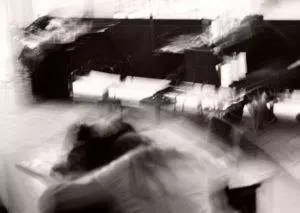
Vertigo causes include migraines and problems with the inner ear. The inner ear and eyes both relay information to the brain about a person’s spatial relation to the environment, so when the functioning of the eyes or ears is disrupted, it can cause a sense of imbalance, and even nausea. Migraine headaches, particularly a specific type called a vestibular migraine, can cause pressure in the head and dizziness and nausea.
Benign paroxysmal positional vertigo (BPPV) is one type of vertigo that causes short-term bouts of sudden dizziness. Benign positional vertigo is caused by the shifting of calcium crystals (canaliths) in the inner ear. This can happen due to a head injury or simply aging.
Other inner ear problems that can cause signs of vertigo include Meniere’s disease and Labyrinthitis. Meniere’s disease is a chronic disorder related to abnormal amounts of fluid (endolymph) collecting in the inner ear. The exact cause of Meniere’s is unknown, but it develops more frequently later in life. Meniere’s disease causes attacks of vertigo that can last from a few hours up to 24 hours. Like migraines with an aura, there is often a period of time during which a set of “warning symptoms” begin to occur, such as: a feeling of uneasiness, being off-balance, headache and dizziness, queasiness, hearing loss or ringing in the ears, or extra sensitivity to sound. Once an attack of vertigo hits, it can be quite severe, causing intense pressure in the ear, blurred vision, vomiting or diarrhea, cold sweats, rapid heart rate, and feelings of fear and panic. There is currently no cure for Meniere’s.
Labyrinthitis refers to inflammation of the small parts of the inner ear, or around the nerves of the inner ear that can be caused by viral or bacterial infections, such as: a flu, measles, herpes, hepatitis, Epstein-Barr, chicken pox, or childhood ear infections. Symptoms of labyrinthitis can include: dizziness, nausea, tinnitus (ringing in the ears), and difficulty concentrating.
Lightheadedness is a similar sensation to dizziness in some ways, but is usually caused by a sudden change in blood pressure or the flow of blood to the head. You have probably experienced feeling light headed and dizzy when you get up too fast from sitting or lying down. Other causes of lightheadedness include: allergies, anxiety, anemia, hyperventilating, arrhythmia, or heavy bleeding (as during menstruation).
Dizzy spells happen to everyone once in a while. But recurrent headache and dizziness should be addressed. Acupuncture and TCM have been used to help dizziness for thousands of years and offer natural solutions to the underlying causes of vertigo.
Top 10 Causes of Dizziness

Feeling light headed and dizzy, or having headache, nausea, dizziness, can occur as symptoms of a variety of imbalances. Reasons for dizziness may include:
- Inner ear imbalance, or labyrinthitis
- Meniere’s disease
- Sleep apnea, snoring
- Migraine – vestibular migraine
- Dehydration – alcohol, diuretics
- Sinus issues
- Ear infection
- Low Blood Sugar – diabetes, hypoglycemia
- Multiple Sclerosis (MS)
- Prescription Medication side effects
Dizzy spells that occur first thing in the morning are common for some people. This can be simply due to the change in pressure in the ear when you get out of bed. Waking up dizzy due to sleep apnea occurs because this condition obstructs your breathing during the night, and you may have lower oxygen levels when you wake up. Being dehydrated is another common cause of dizziness, which is exacerbated by drinking alcohol before bed. In general, drinking too much caffeine, too much alcohol, and not enough water, or taking diuretics can all lead to dizzy spells. Low blood sugar, whether due to diabetes, or simply not eating regularly enough, can also be a cause of light-headedness. Hepatitis, HBV, or HCV can also cause dizziness.
Postural orthostatic tachycardia syndrome (POTS) causes dizziness when moving from a seated or position or lying down to standing up.
Cervical vertigo, or cervicogenic dizziness, is another type of vertigo caused by the positioning of the neck or cervical spine; in this case, the feelings of imbalance and spinning may be accompanied by neck pain. This type of vertigo may happen, for instance, after a whiplash injury.
Treatment for Vertigo
The medical treatment for dizziness and vertigo depends wholly on the underlying causes for the symptoms. If a bacterial infection in the ear is confirmed, then antibiotics may be used. In cases of BPPV, a canalith repositioning procedure (CRP) is a non-invasive technique that can help the crystals within the inner ear move back into their proper place. Migraine-related vertigo may be treated with the medications typically prescribed for migraines. Anti-nausea drugs like Dramamine may be suggested. Patients suffering from cervical vertigo may be referred to physical therapy to help improve the positioning and strength of their neck/cervical spine.
Can Acupuncture Help Dizziness?
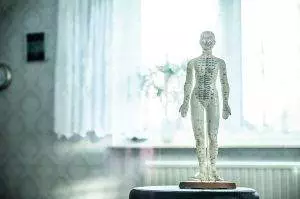
One of the central concepts of TCM is that of the root and the branches. The branches are the visible, outward signs or symptoms of a problem, while the root refers to what is going on deeper in the organ systems of the body. In the cases of dizziness and vertigo, there is deficiency in the root and excess in the branches.
Pathogenic factors involved in dizziness and vertigo are phlegm, wind, fire, and deficient Qi. When there is weakness in organs like the spleen, stomach, kidney, or heart, pathogens like wind, heat, and phlegm can take hold. The San Jiao, also known as the “triple burner,” is another important concept in TCM; one of its primary functions is to control the movements of fluids in the body so that they don’t collect and build up inappropriately. In case of vertigo, phlegm and heat develop to the point of causing stagnation and malfunctioning of the Jiao, pushing phlegm upwards in the body. An acupuncture practitioner will carefully listen and observe to discover which organ systems are out of balance, and work to strengthen those areas. For example, dizziness combined with emotional disturbances like anger and depression is a sign of too much wind or heat in the Liver. Weakness in the heart or spleen may follow a long illness or period of stress and anxiety. Too much phlegm, heat, and dampness in the stomach and spleen can result from an improper diet and too much stress.
Acupuncture and herbs to tonify these organs and clear heat and phlegm will take care of the root of the dizziness. Meanwhile, specific acupuncture points can have an almost immediate effect at relieving immediate discomfort, facilitating a natural vertigo cure.
A study conducted at a hospital in Taiwan used acupuncture to treat patients with dizziness and vertigo. The findings conclusively showed immediate improvement in symptoms.
A study of 60 patients who were admitted to an emergency room suffering from vertigo from a variety of causes, including Meniere’s and BPPV, showed that acupuncture treatment provided immediate relief of symptoms and is therefore a good alternative for dizziness due to various causes.
Top 5 Tips to Get Rid of Dizziness
Depending on the cause of the vertigo, there are different ways to manage with TCM techniques, including vertigo exercises, acupressure for dizziness, moxibustion, and foods to avoid.
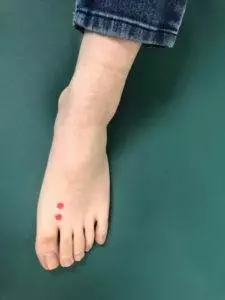
Major 4 types of Vertigo/Dizziness presentation:
- Hypertension type – When a person has high blood pressure, too much liver yang, and is overheated, it can cause dizziness. For this, we use acupressure Liver points 2 and 3 on the toes.
- Qi and Blood deficiency – if a person shows signs of anemia, or has heavy periods, hemoglobin is low, or if a person has chronic conditions, or has suffered a major injury, or recently given birth, experienced major blood loss. For this we want to ensure a good diet with plenty of soups and easy to digest foods. Moxa on the back can help to strengthen the body’s Qi and produce enough blood. Qi Gong exercise of squeezing the earlobes and outer ear up and down is helpful.
- Kidney essence deficiency – this could be due to some constitutional weakness, or due to old age, or someone who tends to have chronic illness, diarrhea. The kidney essence can’t support rising essence to the head. For this, acupressure for Kidney 1 – on the bottom of the foot.
- Phlegm stagnation – when the middle jiao is not working due to stagnation of phlegm creating blockage so Qi cannot ascend. This happens when people are overweight, or have poor digestion, diarrhea. Avoid dairy and fried foods, which encourage phlegm. Moxibustion treatment to the back is helpful, and applying pressure to Stomach-36 acupressure point can help the middle jiao open up.
- Neck Pain – if a neck problem is causing a blockage, due to a neck disease or bulging disc, unhealthy cervical disks, compression, tension, and muscle spasms can block upwards energy. Exercises to encourage the health of the neck discs, loosen up the muscles and allow flow of Qi and blood up to the head. Your acupuncture practitioner will recommend neck exercises to help with this.
Acupuncture Near Me for Dizziness
Vertigo and dizziness may not be life-threatening symptoms, but they can have a big impact on your daily life. Frequently being blindsided by unexpected dizziness, spinning sensations, nausea, and headaches is unsettling and debilitating. Medications can be helpful in some cases, but they can also cause unwanted side effects. Getting to the root cause of vertigo with acupuncture and TCM will help get rid of dizzy spells so they don’t keep coming back.
*This article is for education from the perspective of Traditional Chinese Medicine only. The education provided by this article is not approved by FDA to diagnose, prevent, treat and cure human diseases. It should not stop you from consulting with your physician for your medical conditions. Traditional Chinese Medicine is based on Qi, which is an invisible force that usually cannot be observed by modern science. Because science focuses on testing ideas about the natural world with evidence obtained through observation, these aspects of acupuncture can’t be studied by science. Therefore acupuncture and Chinese herbs are often not supported by double-blind, randomized trials, and they are considered alternative medicine therapies in the United States.
How to Treat Lyme Disease With Acupuncture and TCM
By Xiaomei Cai, L.Ac., Ph.D. & Qineng Tan, L.Ac., Ph.D.

Red, circular rash that looks like a “bulls-eye?” Joint pain, muscle aches, and fatigue? These are signs that a person may have Lyme disease, an infectious disease that humans can contract when they are bitten by an infected tick. Lyme, a bacterial infection, can take a while to develop, and can cause chronic symptoms if it is not treated effectively. Acupuncture and TCM offer an alternative or adjunct way to help resolve the painful, debilitating symptoms of long-term Lyme disease.
Lyme disease is a type of bacterial infection transmitted by ticks. Ticks are parasitic arachnids, small spider-like creatures who bite other animals and feed on blood. If a tick is infected with a disease, it can infect the person or other animal it bites. Lyme disease, which is caused by the Borrelia burgdorferi bacterium, is just one of several infectious diseases that ticks can spread, including Rocky Mountain Spotted Fever (RMSF).
These critters are sometimes called “deer ticks” or “bear ticks” because they generally thrive in forest environments where they live symbiotically with these kinds of animals. But being bit by deer tick (tick on deer) doesn’t only happen in deeply wooded areas; anywhere that deer, squirrels, lizards, or birds may come into suburban areas, it is possible to be bitten by a tick. Actually, ticks, and therefore the infectious diseases they carry, are growing more prevalent because of humans encroaching into animals’ habitats. Tick bites most commonly occur in spring and summer.
Ticks do not fly; they can only get onto dogs or humans by crawling on them. This can happen quite easily if a tick is on a bush or other plant, and a person or dog brushes up against it. Ticks attach themselves to a host, and slowly suck their blood.
Lyme disease in dogs cannot be transmitted to humans, nor is lyme disease contagious, passing from human to human; you can only get Lyme disease by being bitten yourself. In order to pass Lyme disease to a person, a tick generally has to have been attached to that person’s skin for 36 hours or more. Ticks can be as small as the head of a pin, and they burrow in moist, hairy areas of their host’s body, so it is actually quite easy to have a tick on you without knowing it. After the tick drops off, a person may not feel anything at all, or only have a small, red bump that resembles a mild insect bite. In some cases, though, a person may feel right away that the area of the bite is hot, swollen, or causing a burning sensation.
If the tick was carrying Lyme disease, it can take several days to a few weeks for the more serious symptoms of Lyme to develop. Even then, the symptoms are not necessarily distinctive.
The early symptoms of Lyme disease can feel like a flu; fever, fatigue, aches and pains. Not everyone infected with Lyme will have the characteristic tick bullseye rash that develops around the site of the tick bite. When treated promptly with antibiotics, most cases of Lyme disease will resolve within a few weeks. However, many cases of Lyme disease are not diagnosed right away, and if it goes undetected, chronic problems can develop in the ensuing months. Once the bacteria has spread throughout the body, even a long course of antibiotics may not be able to get rid of it. Long-term Lyme symptoms may appear similar to other chronic inflammatory, autoimmune, or neurological conditions, such as fibromyalgia, Bell’s palsy, MS, chronic fatigue syndrome, or PTSD.
In extreme cases Lyme disease causes shoulder pain, hip pain, knee pain, fatigue, and other symptoms so severe that people can’t go about their regular daily routine. Sometimes diagnosis and treatment is further complicated by coinfections: concurrent other infections, that can also have been transmitted via the tick bite, or occur independently of it. Lyme and other tick-borne illnesses like RMSF can also trigger sepsis infections, which can be life-threatening, or lead to chronic pain, and/or PTSD (post-traumatic stress disorder). An MRSA skin infection (Methicillin-resistant Staphylococcus aureus), a type of staph infection that enters the skin through a wound, can develop around the infected tick bite; this staph skin infection is particularly resistant to antibiotics.
Unfortunately, symptoms of Lyme can become progressively worse over time, leading to disability and even death. Acupuncture and TCM offer an alternative for helping to heal Lyme disease, whether it is still in the early stages, or when it has become a chronic infectious disease.
Top 10 Symptoms of Lyme Disease

Signs of Lyme disease develop slowly, in stages, and can vary widely from person to person. Without the presence of the tell-tale bulls’ eye rash, both patients and doctors may have difficulty linking the spectrum of symptoms to a Lyme infection.
- Joint pain, swollen joins, arthritis
- Neuropathy, numbness or tingling, Bell’s palsy (face drooping)
- Fatigue
- Bulls-eye rash, also known as erythema migrans rash
- Headaches, migraines
- Sleep problems, sleep apnea, snoring
- Brain fog
- Trouble breathing
- Vertigo, dizziness
- Blurred vision
Other possible symptoms of Lyme include: ringing in the ears (tinnitus), heart palpitations, problems with memory and concentration, vision problems or inflammation around the eyes, and liver problems, like hepatitis. Symptoms of lyme disease in dogs are similar to those in humans, including stiff, swollen joints, tiredness, and loss of appetite.
Long-term effects of Lyme disease are sometimes referred to as “post-treatment Lyme disease syndrome.” Doctors are not sure why some people, even after being treated with antibiotics, seem to still be affected by long-term effects of Lyme disease.
Medical Diagnosis and Treatment of Lyme Disease
Getting a clear diagnosis of Lyme disease can be difficult. Currently, there is a two-step diagnostic process recommended to determine if a person has contracted Lyme disease. Two main kinds of tests can detect antibodies the body’s immune system creates to fight off the infection. However, it takes a while–at least several weeks, usually–for the body to build up enough of the antibodies that they become detectable. Often when people are aware early on that they may have been infected, and they get a test, it turns out to be negative. Usually, doctors try first one type of antibody test, and then the other to see if they get a positive result. Even then, medical science acknowledges that many (perhaps half of) Lyme disease cases are not detected this way.
A newer, still somewhat unproven form of testing involves taking a blood culture and trying to grow the bacteria that cause Lyme in a laboratory setting. This testing is more advanced and may be difficult for patients to access.
Once physicians have determined that Lyme infection is present, the usual treatment is a course of antibiotics that lasts a few to several weeks. In many cases, this seems to clear up the infection. In others, though, the antibiotics do not resolve the myriad symptoms patients are experiencing. Using antibiotics on a long-term basis is often not effective, and carries other risks to a person’s health.
Ongoing joint pain and inflammation is then usually treated with steroid medications or NSAIDS. Sleep problems and fatigue are often treated with antidepressants. These medications may help relieve symptoms temporarily, but they come with side effects, and do not address the root causes of the chronic symptoms of Lyme disease.
3 Stages of Lyme Disease
When early detection occurs, the Western medical approach of using antibiotics can often resolve Lyme disease within a few to several weeks. However, if the infectious disease is not found soon enough, Lyme disease will progress to more advanced stages. TCM methods can be helpful during all three stages of Lyme.
- First Stage Lyme disease – Within the first few weeks of the infection, and with early detection, antibiotics can be very helpful, working pretty well to stop the spread of the bacteria. However, because Lyme disease is often misdiagnosed, many people do not receive this treatment soon enough. During this phase, the symptoms are similar to those of the flu: chills, fatigue, heaviness in the limbs. As the infection moves in deeper, it can cause the skin rash, or hives. TCM treatment during the first stage will focus on clearing heat and detoxifying the body to rid it of infection.
- Second Stage Lyme disease – If the bacteria causing Lyme disease is not halted in its spread, it begins to affect the organs and the blood. The central nervous system and heart can become infected. These infections can last for months, and if not taken care of, can develop into the third phase. This is when a person may begin to feel joint aches, and arthritis-like symptoms. The body’s Qi and blood become deficient. Treatment with acupuncture and herbs at this point will work to help boost the Qi, clear heat and strengthen the whole immune system, and clear inflammation.
- Advanced stage Lyme disease – As the infection drags on, it can cause joint, skin, and nerve damage can take hold. Ongoing Qi and blood deficiency and stagnation cause fatigue, dizziness, insomnia, and memory loss.
A TCM provider will recognize what stage of Lyme disease a patient is in according to their symptoms, and customize the acupuncture points and herbal formulae used depending on their needs.
Acupuncture for Infectious Diseases

For millennia, TCM has recognized a type of disease that is caused by infection and can affect all systems of the body. We call this type of illness Gu zheng, or “Gu syndrome.” This classification covers illnesses caused by “invisible” pathogens, like viruses, funguses, and parasites. Along with the toxins from the tick bite, we consider how pathogens like heat, wind, and dampness all play a role in the illness. According to TCM theory, extreme heat in the body is also considered “toxic.” This category of condition helps us understand a variety of different systemic inflammatory illnesses, and gives us a framework for addressing each individual’s presenting symptoms.
One of the key features of Gu syndrome illnesses is how terrible and hopeless they can make people feel. Not only do people suffering from chronic inflammatory or immune-related conditions feel constantly tired and ache-y, but some of the sensations seem to come and go and feel so mysterious that they can’t be explained satisfactorily. If this is then compounded with the fact that many doctors don’t understand or know how to deal with the illness, it can leave patients feeling very frustrated and helpless. After months or years of this, debilitating physical symptoms may be accompanied by feelings of depression and anxiety.
A Yale Medical University study of patients, all in their 40s, suffering from long-term Lyme complications found that they had to reduce their activities, or even give up working, and doubted that they would ever recover. In interviews, patients made it clear that working with doctors who were more holistic was far preferred, and thus many had turned to CAM (complementary and alternative medicine) providers for help with Lyme disease.
Making a full recovery from long-term Lyme disease is possible, but it can take a long time to get rid of a bacterial infection that has woven itself deeply into the body’s organ systems. The benefit of Chinese herbal medicine for Lyme is that the powerful substances in the herbs can penetrate deep into the body at a cellular level. Working with an experienced acupuncturist means that your Chinese herbs for Lyme disease can be regularly updated, according to your individual needs, as you progress. This, in combination with acupuncture treatment for Lyme disease, moxibustion, and nutrition guidelines for an anti-inflammatory diet can all help patients feel better faster and prevent any further damage to the organs and the nervous system. Our TCM detox program may also be helpful.
Top 5 Tips for Lyme Disease Self-Care

Sometimes re-prioritizing health over all else is necessary in order to heal from a serious infectious disease.
- Conserve energy. Rest as much as possible.
- Drink extra water.
- Eliminate coffee, alcohol, spicy foods, chips, roasted nuts, any food that adds heat and inflames further. Try to reduce heat.
- Eat more cooling foods. Mung bean tea is an ideal choice.
- In the later stages of the disease, we may need to add more strengthening foods, like chicken stock and soup, and will recommend different herbal formulae, as well.
Overall, reducing stress and finding a meditation practice is helpful. For more detailed instructions on how to eat right to reduce inflammation, see our article specifically addressing anti-inflammatory food and lifestyle choices.
Acupuncture Near Me for Lyme Disease
Dealing with a complicated illness like Lyme disease is challenging for people and doctors. A long process of discovery and commitment may be necessary. Working with an experienced TCM provider gives patients the benefits of a multi-pronged, holistic way of addressing multiple symptoms, both physical and emotional. Acupuncture for infectious diseases like Lyme takes into account each patient’s individual concerns, and addresses the complex symptoms of Lyme in concert.
*This article is for education from the perspective of Traditional Chinese Medicine only. The education provided by this article is not approved by FDA to diagnose, prevent, treat and cure human diseases. It should not stop you from consulting with your physician for your medical conditions. Traditional Chinese Medicine is based on Qi, which is an invisible force that usually cannot be observed by modern science. Because science focuses on testing ideas about the natural world with evidence obtained through observation, these aspects of acupuncture can’t be studied by science. Therefore acupuncture and Chinese herbs are often not supported by double-blind, randomized trials, and they are considered alternative medicine therapies in the United States.
How to Treat a Herniated Disc With Acupuncture & TCM
By Qineng Tan, L.Ac., Ph.D. & Xiaomei Cai, L.Ac., Ph.D.
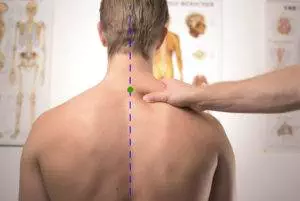
Why do I have a sharp shooting pain down one leg? What should I do if my neck is stiff and hurts to turn? What can I do to help a spasm in lower back? Any of these kinds of pain may be caused by a herniated disc, which presses on the spinal nerves. Acupuncture can be an effective treatment for relieving the symptoms of a slipped disc, while also speeding the healing process–all without negative side effects.
A herniated disc, often referred to as a “slipped disc,” or a bulging disc, occurs when damage to one of the shock-absorbing discs of cartilage that sit between the vertebrae creates pressure on the nerves and muscles of the spine. Also called a prolapsed disc, this condition creates inflammation and swelling in a localized area of the spine and can cause severe pain in the neck, lower back pain, sciatica pain, and tingling that radiates down the leg.
The vertebral column, or backbone, is made up of vertebrae (individual bones) and intervertebral discs. These discs provide cushioning in between the bones and act as ligaments that hold the bones together. The discs create a shock absorption system that protects the spinal column, and are made up of tough, fibrous outer layers of cartilage, with a gel-like substance on the inside. If there is damage to the tissues of the outer layer, the soft, gel interior can be pushed outwards and breach the outer wall. This can create pressure against the nerves of the spinal column, resulting in symptoms of nerve entrapment: pain, numbness, and/or loss of ability.
A herniated disc, also referred to as a “ruptured disc,” most often occurs in the lumbar spine. A lumbar herniated disc may cause severe lower back pain if it is pressing on a nerve. Pressure on the sciatic nerve area can also cause shooting pain, burning pain, numbness, and/or tingling in one or both legs–a condition commonly referred to as sciatica, also known as lumbar radiculopathy. The sciatic nerve is actually a large bundle of smaller nerves that connects the base of the spine to the top of the leg, travelling through the buttock area. There is a sciatic nerve bundle on each side. About 90% of cases of sciatica are related to herniated discs.
Cervical disc herniation refers to a prolapsed disc between one of the seven vertebrae of the cervical spine, or neck area. Compression of the nerves due to a herniated disc in the C2 area can cause headache, or pain in the eye or ear. Herniation of a disc further down the cervical spine happens most commonly in the C5, C6, or C7 area, which can lead to neck pain and/or shoulder pain.
Most of the time, sciatic pain or neck pain due to nerve compression in the spine goes away gradually on its own, but it can cause a lot of suffering over the course of several weeks or months before resolving itself. Medical treatment for herniated disc pain typically involves the recommendation of rest and immobilisation and the use of anti-inflammatory medications, muscle relaxers, and pain relievers. However, lack of movement does not really help improve the root cause of the pain, and the use of pain medications or steroids is often accompanied by unwanted side effects. Acupuncture treatment can significantly reduce acute pain related to sciatica, neck pain, shoulder pain, and low back pain due to slipped discs, often providing immediate, short-term relief of severe pain, while helping, long-term, to reduce inflammation and help heal nerve damage.
Signs of Herniated Disc
When a disc herniates, pain can be sharp and intense. Depending on which disc is affected, there may be neck pain, low back pain, or sciatic pain in the leg, foot, or buttock area. Pain or numbness are caused by the inflammation of the nerve area that is being compressed by the extrusion of the center of the disc.
- A cervical herniated disc (in the neck) may cause burning pain in the side of the neck or sharp pain in the back of the neck. Or there may be a more subtle sensation where the neck is tender to the touch. The pain is usually worse when performing vigorous activities or when twisting or turning the head at a certain angle. The overall movement of the neck and head may feel limited and stiff.
- Pain may radiate down the arm and cause an “electric shock-like” sensation in the hand and fingers.
- Weakness in the muscular movement of the shoulder, arm, hand, thumb and fingers may result from the pinching of the nerves of the cervical spine.
- A lumbar herniated disc (in the lower back) is more likely to cause pain down the leg than in the back. Usually the pain is just on one side of the body. This radiating pain caused by compression of the sciatic nerve can be sharp, burning, and very intense.
- Herniation of a lumbar disc can also cause pain in the low back or buttock. This pain may be of the “throbbing” type, or feel like a spasm. It may be helped by applying cold or heat to the area. The pain typically is worse after sitting or hunching over for a while, or when bending over from the waist.
- The sensation in the buttock, hip, leg and foot may be more like tingling or numbness than searing pain.
- “Foot drop” is when the nerve compression makes it difficult to fully pick up the foot when walking, so that the toes drag on the floor.
The kind of pain caused by a herniated disc can come on quite suddenly and strongly. Fortunately, the pain caused by most herniations of spinal discs resolves in a matter of time without surgery.
What Causes Herniated Disc?
Slipped discs, or bulging disks, happen most often to people between the ages of 30 and 50. The ruptured disk may happen due to one sudden movement, like lifting something heavy, twisting an awkward way, or even a strong sneeze. But prior to such an event, there was probably some weakness already developing in the outer walls of the disc.
Degeneration of the discs can occur over time due to aging. A chronic herniation can develop slowly over years and cause mild symptoms. An acute herniation might happen as the result of some trauma, like an accident, which could create more serious damage to the outer layers of the disc (the annulus fibrosus), allowing the jelly-like material inside (the nucleus pulposus) to extrude, or squeeze out of containment.
Surgery for herniated disc is only recommended in rare cases (10-20%), sometimes if the prolapsed disc is affecting the nerves in such a way that bladder or bowel function is negatively impacted. Surgery may also be considered if pain is severe and continues for a long time without getting better. Herniated disc surgery attempts to relieve the nerve compression by removing some of the disc tissue. In cases where there is more extensive degeneration of the spine, a spinal fusion procedure may involve “fusing” the vertebrae together with screws while removing the original disc tissue and replacing it with an implant. These types of surgeries for herniated disc may help alleviate pain, but there can still be a long recovery period, and the pain is not guaranteed to go away.
Can Acupuncture Help a Herniated Disc?

Traditional Chinese Medicine (TCM) has been developed over the course of thousands of years to deal with all types of pain conditions. In the TCM view, herniated disc pain is caused by:
- Injury to the spine
- Invasion of cold, wind, or damp
- Liver and/or kidney deficiency
In addition to acupuncture treatment, which involves the insertion of very fine needles into specific points along the meridians of the body, we also use treatments such as moxibustion and infrared heat lamps to bring warm energy to parts of the body. TCM treatment for herniated disc will often focus on strengthening the Qi (life force energy) and blood flow to the kidneys, and clearing dampness and bringing warmth to the whole lower back area.
One clinical trial conducted in a hospital demonstrated that acupuncture treatment combined with the application of moxa warm needle therapy with infrared heat and gentle exercise resulted in reporting of 95% improvement in pain related to lumbar herniated disc.
A recent systematic review of acupuncture treatment for disc herniation concluded that acupuncture provided better results than pain medications or lumbar traction.
A study that focused on long-term outcomes for patients with lumbar disc herniation showed that ten years after receiving electric acupuncture treatment for their pain they reported positive long-term results, acupuncture having helped to resolve their sciatica symptoms.
Top 5 Tips for How to Heal a Herniated Disc Naturally

Most pain due to herniated disc will resolve itself in about six weeks without medical treatment. In the meantime, there are some things you can do to help reduce pain and restore freedom of movement.
- Seek out treatment from a qualified acupuncturist. A combination of acupuncture, herbal supplementation, tuina massage, moxibustion, and infrared heat therapy will go a long way towards relieving pain and encouraging healing.
- Heat and Cold Therapy. Try using a heating pad or hot water bottle to apply gentle heat to the lower back or neck. Alternate with icing the affected area. This helps bring more blood flow to the area, reduces inflammation, and soothes stiffness.
- Stay active. It can be tempting to stay in bed when lower back pain and sciatica are causing intense pain or tingling sensations. But immobilisation does not really do anything to help heal nerve pain, and it is actually more beneficial to keep the muscles of the back body strong. Engaging regularly in low-impact activities like walking, biking, or swimming will help keep endorphins flowing and your mood positive better than bed rest will.
- Check your sleeping position. Staying in bed can also hurt when you have a slipped disc. Use a pillow to bolster your knees to help relieve tension in the lower back and keep the spine in proper alignment. Use a firm orthopedic pillow to keep the neck aligned.
- Nutrition for nerve health. Certain nutrients can be especially beneficial for building and maintaining nerve tissues. Emphasize B-6 and B-12 vitamins, Vitamin E and Omega-3 and Omega-6 fatty acids in your diet and with high quality supplements. Nuts, fish, and good plant-based oils should be consumed regularly.
Regular exercise, plenty of sleep, and good nutrition, as always, will go a long way towards helping ensure that a pain condition resolves itself fully and does not return.
Acupuncture Near Me for Herniated Disc
At Art of Wellness, Dr. Tan and Dr. Cai have over 30 years of experience helping patients with acute and chronic pain due to neurological conditions. Pain due to a herniated disc can be effectively reduced by regular acupuncture treatment, while Chinese herbs and therapeutic massage can help bring healing to the nerves and spine, and help prevent future problems with herniated disc and sciatica.
*This article is for education from the perspective of Traditional Chinese Medicine only. The education provided by this article is not approved by FDA to diagnose, prevent, treat and cure human diseases. It should not stop you from consulting with your physician for your medical conditions. Traditional Chinese Medicine is based on Qi, which is an invisible force that usually cannot be observed by modern science. Because science focuses on testing ideas about the natural world with evidence obtained through observation, these aspects of acupuncture can’t be studied by science. Therefore acupuncture and Chinese herbs are often not supported by double-blind, randomized trials, and they are considered alternative medicine therapies in the United States.
How to Treat Fatigue With Acupuncture and TCM
By Xiaomei Cai, L.Ac., Ph.D. and Qineng Tan, L.Ac., Ph.D.

With so much going on in our lives these days, it is no wonder that many of us feel exhausted and tired all the time. Stress and lack of sleep are so common now that many people are easily tired. But when it gets to the point that a person is always tired, so much that he or she never feels rested and has trouble engaging in normal daily activities, fatigue becomes a serious health concern that requires attention.
Extreme fatigue is a mental and/or physical lack of energy that goes beyond normal tiredness. Physical or muscle fatigue prevents a person from engaging the body in the ways he or she is used to being able to, while being mentally exhausted causes sleepiness and an inability to focus the mind enough to perform one’s usual tasks. Transient or acute fatigue occurs when a person is deprived of sleep over a few days. In general, it is recommended that adults get 7-8 hours of sleep per night. However, a large published report showed that more than a third of Americans regularly sleep less than seven hours per night. Poor sleep habits do more than cause excessive tiredness; they can lead to all kinds of chronic health problems.
Conventional medicine has a limited understanding of fatigue causes, and does not offer much in the way of solutions for fatigue symptoms. Whether fatigue is acute or chronic, acupuncture and TCM offer proven benefits without any negative side effects.
Causes of Chronic Fatigue
Constant fatigue and extreme exhaustion that last for more than three to six months may be signs of Chronic Fatigue Syndrome (CFS) or Myalgic Encephalomyelitis (ME). As a syndrome, CFS/ME is a collection of symptoms that are often seen together, but is not fully understood by the medical community as a disease. CFS symptoms include:
- Extreme exhaustion that is made worse with physical or mental effort (post-exertional malaise, or PEM), i.e., feeling completely spent after any exercise or mental stress
- Sleep is not refreshing
- Foggy head, cognitive impairment
- Joint pain
- Constant sore throat
- Swollen lymph nodes
- Severe headaches
- Extreme sensitivity to lights, noises, smells, foods and chemicals
It can be difficult for doctors to come to a firm diagnosis for different types of fatigue, partly because the symptoms are “invisible” and subjective, but also because there are other health conditions with similar symptoms, in particular fibromyalgia and lupus. The causes of chronic fatigue have not been fully identified, but it is believed that CFS can be triggered by infections, particularly deep candida infection, immune dysfunction, nutritional deficiencies, extreme stress, Epstein Bar virus (EBV, mono), or a combination of these factors. Some studies have indicated that people who experienced childhood trauma may have increased risk of developing CFS, and that psychological stress due to post traumatic stress disorder (PTSD) is linked to CFS.
As of now, conventional medicine has no officially approved treatment protocol for chronic fatigue. Generally, patients are instructed to rest, pace themselves while practicing gentle exercises, and learn to avoid triggers that make their fatigue worse. Doctors may offer medications to help insomnia and antidepressants to help with emotional instability, but these types of drugs can have negative side effects and create dependency. Traditional Chinese Medicine works on a deeper level to address headache, dizziness, fatigue, muscle and joint pain with fatigue, and eye strain symptoms.
Sometimes constant tiredness is attributed to adrenal exhaustion. Adrenal Fatigue Syndrome is not a formally recognized medical diagnosis, but this, too, is a collection of symptoms that is theorized to be related to chronically low levels of the adrenal hormone cortisol. Cortisol is produced in short bursts when we are under stress; this is often called the “fight or flight” response. Going through an extended period of stress might lead to the adrenal glands becoming depleted. People with adrenal fatigue symptoms like tiredness, trouble sleeping, and cravings often rely on caffeine and sugar to help them get that burst of energy. Adrenal fatigue treatment by TCM helps to naturally balance the hormones, while lifestyle modifications implemented over time help resolve feeling so tired all the time.
How Is Fatigue Related to Stress?

Clearly there are links between stress and fatigue. Stress is the body’s reaction to difficulties and situational changes. When stress builds up over time, the body and mind become exhausted. Chronic stress can lead to emotional exhaustion. Lack of focus and motivation leads to poor decision making, and then a person can no longer take proper care of herself and her loved ones. Mental health issues such as anxiety, depression, and PTSD become intrusive and disruptive to daily life. In today’s world, we are all subjected to many stressors every day. Simply processing a constant onslaught of new information on top of all of the other things we are expected to manage is bound to cause mental fatigue. Feeling overwhelmed is the new normal, but in order to prevent it from becoming a serious health problem, we need to address emotional fatigue.
How Is Fatigue Related to Sleep Problems?
We need nourishing food and restful sleep to function optimally. If an individual does not prioritize healthy eating and getting enough sleep, eventually the body becomes seriously depleted. Feeling tired after eating is a sign that one might be eating the wrong foods, or at the wrong times. Extreme fatigue after eating is also an indicator that when a person does sleep, he or she is not getting good quality sleep. Working on behavioral modifications to improve sleep quality is certainly an important part of addressing fatigue, as is finding a physical activity program that improves energy.
How Is Fatigue Related to Hormones and Women’s Health?
Women often experience fatigue as they go through hormone changes. Feeling lethargic due to PMS, PMS fatigue or period fatigue is common. Fatigue during pregnancy can cause women to feel weak and tired. Women going through menopause commonly feel over tired. These types of hormone related fatigue can be helped by balancing the hormones with acupuncture and herbs.
How Can Acupuncture Help to Fight Fatigue?
The most fundamental concept of Traditional Chinese Medicine is that of “Qi,” the life force energy that flows through the body. According to TCM, fatigue is related to the quantity and quality of Qi a person is able to maintain. Qi deficiency, then, is the primary cause of fatigue. Deficiencies can show up in different ways:
- Spleen-pancreas – This is the organ system that directs digestion. When this is weak, people might feel bloated after eating, tend toward loose bowels, feel weak and depressed, and bruise easily. This can be due to erratic eating patterns, especially too many sweets. Worrying or over-thinking can also be part of the problem. Many people go through stressful periods when they exhibit these behaviors and symptoms.
- Lung – The lungs do the job of extracting Qi from the air we breathe. Sometimes lung Qi is weakened when we do a lot of talking as part of our work without taking enough breaks. Emotions of grief and sadness can also weaken the lungs. This may present as being prone to coughs or colds.
- Blood Deficiency – This often goes together with Qi deficiency. A heart-related blood deficiency can lead to feelings of anxiety and restless sleep. A liver-related blood deficiency can cause eye strain symptoms.
- Yang Deficiency – Lack of heat energy in the body causes weakness with body aches and fatigue. This differentiation can cause menopausal fatigue and low back pain.
An acupuncture practitioner will first perform a thorough consultation and exam to identify the specific symptoms of fatigue and the factors potentially causing them. A course of treatment might include not only acupuncture to stimulate points along the meridians, but also moxibustion, a topical therapy used to cultivate warm energy.
One formal study of patients diagnosed with CFS showed significant improvement in both physical and mental fatigue among participants who received daily acupuncture over the course of ten days.
Another study of chronic fatigue patients who were given acupuncture as a complement to conventional treatment showed greater improvement over patients who did not receive acupuncture.
Acupuncture has been shown to increase serotonin levels, which help improve sleep and mood. This means it can be an effective treatment for fatigue and depression, without the side effects and dependence that are often caused by SSRIs (antidepressants that work on serotonin levels in the brain).
Chinese herbs are used in customized combinations to address imbalances in the organ systems. TCM herbal remedies are an integral part of treatment for chronic fatigue, and should be combined with your acupuncturist’s nutritional recommendations to nourish Qi and reverse fatigue.
Top 10 Tips to Beat Fatigue
While acupuncture treatment and herbal support will go a long way to combat fatigue, it is critical that patients make meaningful lifestyle modifications. New habits will not only improve symptoms of fatigue, but prevent exhaustion in the future.
- Timing is everything – The adrenal hormones will be more balanced if you follow natural circadian rhythms. This means, ideally, rising with the sun and going to bed well before midnight. Exercise early in the day rather than stimulating the body with activity in the evening. Stick with the same sleep routine, even on weekends and holidays.
- Cut caffeine – Drinking coffee or sodas to stay sharp is actually very detrimental to your health. Think of it as borrowing energy; you’ll have to pay it back later, with interest. If you are used to multiple caffeinated drinks per day, start by reducing them gradually. Then, take at least a few weeks off of caffeine entirely.
- Avoid Alcohol – Even though it may feel like a glass of wine helps you relax in the evening, alcohol has a negative impact on the quality of sleep, often causing you to sleep lightly and wake in the night. Again, start by cutting back, and try to abstain entirely until fatigue has improved.
- Drink more water – Dehydration reduces mental alertness and physical stamina. Drinking 8 glasses of water per day ensures that nutrients and oxygen are moving smoothly through the bloodstream and that toxins are being excreted properly. Don’t wait until you’re thirsty; by then, you are already dehydrated. Remind yourself to drink at regular intervals.
- Eat more frequently to maintain blood sugar levels and energy. Smaller meals eaten every 3-4 hours throughout the day

Walnuts are a great source of Omega-3s are better than 2-3 large meals.
- Get enough Omega-3 – Fatty acid supplementation has been shown to reduce symptoms in CFS patients. Good sources of Omega-3 fatty acids include: fish, fish oil, flaxseeds, chia seeds, hemp seeds, and walnuts.
- Short bouts of exercise – Even when the mildest exertion can be exhausting, it’s vital to establish and maintain regular physical activity. A short 15 minute walk outdoors will help get the blood pumping, and exposure to sunlight is crucial for getting Vitamin D to boost immune function.
- Qi Gong – This gentle form of exercise is part of the holistic health care system represented by TCM. The focused breathing and subtle movements of Qi Gong are designed to nurture Qi. Specific exercises will help to bring in more Qi, encourage Yang fire energy, and relieve stress.
- Yoga – Another practice that goes beyond physical exercise, yoga encourages specific breathing and meditation techniques that harness “Prana.” Similar to concept of Qi, Prana is life-giving energy that we can take into the body from the environment through deep breathing.
- Rest – Prioritizing rest means more than getting enough sleep at night. Change your mindset from one of constant “busyness” and productivity. Give yourself time to rest, read, meditate, listen to music, laugh, and just do nothing. If you have to convince yourself, remember, “doctor’s orders–I have to rest!”
Acupuncture Near Me for Dealing With Fatigue
Now more than ever, extreme stress, lack of sleep and activity, and constant triggering events can cause chronic fatigue. Fatigue is feeling more than tired; it can become a real health concern if you are so physically and mentally exhausted that you cannot get up and face your day. Do not hesitate to reach out for help. The doctors at Art of Wellness are TCM experts with over 30 years of experience helping patients heal unresolved traumas, restore balance and replenish their energy. Call today to get started with a treatment plan to banish fatigue.
*This article is for education from the perspective of Traditional Chinese Medicine only. The education provided by this article is not approved by FDA to diagnose, prevent, treat and cure human diseases. It should not stop you from consulting with your physician for your medical conditions. Traditional Chinese Medicine is based on Qi, which is an invisible force that usually cannot be observed by modern science. Because science focuses on testing ideas about the natural world with evidence obtained through observation, these aspects of acupuncture can’t be studied by science. Therefore acupuncture and Chinese herbs are often not supported by double-blind, randomized trials, and they are considered alternative medicine therapies in the United States.
